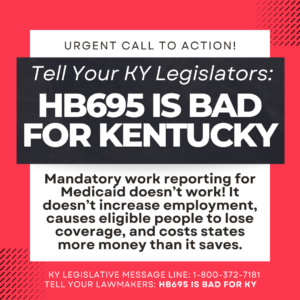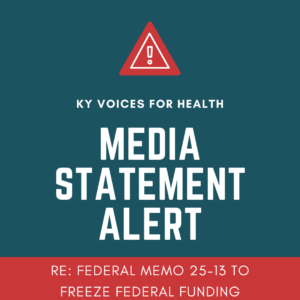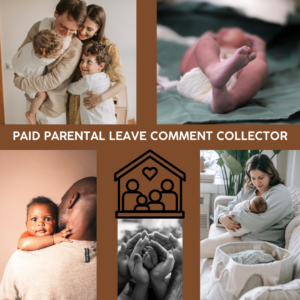
Don’t say we didn’t warn you! Changes to the Kentucky Medicaid waiver are happening at the last minute! Since the posting of our first installment of Unwinding the Red Tape, there have been changes to some populations in the Medically Frail category. It appears the Centers for Medicare & Medicaid Services, the federal Medicaid oversight agency, did not approve of refugees and survivors of domestic and interpersonal violence (DV/IPV) falling into the “medically frail” category.
The good news is that the state is making good on its promise to extend protections to these vulnerable populations, so refugees and DV/IPV survivors will remain exempt from work program and premium payment requirements, and they will still be able to access dental and vision services without having to earn rewards dollars.
The down side is that there is no system support for these new provisions, so these protections will be provided through a handful of system work-arounds.
So…how will this work?
All refugees and DV/IPV survivors, regardless of income and presence of children, will have a $1 per month premium requirement regardless of income level, but we have been informed the premium will be waived. Also, these members will show as “required” to participate in the work program, but with a “zero monthly hours” requirement.
Refugees and DV/IPV survivors with no children will be placed into the Alternative Benefit Plan (see post 2). These members will only be able to access dental and vision services through a My Rewards account, but we are told they will be provided a beginning balance of $500, and that the account may be replenished as necessary. Although this will mean some additional administrative effort on the part of providers, it should be invisible to the member. We also understand the Cabinet is working to find a way to provide Non-Emergency Medical Transportation (NEMT) services for refugees and DV/IPV survivors on a case by case basis, but it is not yet clear how that benefit will be operationalized (i.e. Who you gonna call?). NEMT is an important benefit that helps many members get to their doctors’ appointments.
For members of these populations with children, placement in the PACA (State Plan) or ADLT (Alternative Benefit Plan) will depend on income and household size, also covered in post 2. We at least know that those covered by the State Plan will have access to NEMT.
Please note that this is a developing situation, and that notifications regarding premiums and community engagement requirements may be very confusing. This entire process will be confusing (in addition to the regular level of red tape found in Kentucky HEALTH). Members with ANY questions about these protections for refugees and DV/IPV survivors will need to contact DCBS, either directly or with the help of an application assister.
Finally, the issue relating to the attestation process for identifying as a DV/IPV survivor has not yet changed. At this point, the system is not designed to allow members to attest through the benefind Self-Service Portal, requiring attestation through a DCBS caseworker. The role of assisters and providers in this process is not confirmed at this time. Kentucky Voices for Health is working with the Kentucky Coalition Against Domestic Violence in advocating for an easier and more confidential path to claim these important protections.
—
Starting July 1, Kentucky’s Cabinet for Health and Family Services will implement most of the requirements in its approved 1115 Medicaid waiver—called Kentucky HEALTH (which stands for Helping to Engage and Achieve Long Term Health). The waiver changes take away some benefits, gives them back with a “rewards” program, and implements work and cost-sharing (that’s premiums and/or copayments) requirements. While there is substantial disagreement in the healthcare and health advocacy community regarding the waiver’s provisions, one thing is certain: time won’t stop, and July 1 will get here before we all know it. Medicaid expansion has provided about 500,000 individuals access to healthcare they’ve never had before. To say that this has been a transformative event for so many individuals, the healthcare system, and the Commonwealth as a whole would be an understatement. All stakeholders need to better understand the myriad of eligibility and benefit package changes in order to maintain this access for those eligible. This is important work.
This is the first in a series of pieces from Kentucky Voices for Health taking a deeper dive into the nuts and bolts of the waiver’s requirements and how they impact Medicaid members, their families, providers and application assisters. And I’ll start by discussing in-depth what we know and understand regarding the process of being identified as Medically Frail.
Before diving head-first into any topic, a disclaimer. Any information below is based on our knowledge and understanding of information provided by or through the Cabinet as of right now. There are no policy manuals or state regulations in place for now. Some questions have been provided to the Cabinet several times and remain unanswered. Information presented here will be updated as needed.
Why is this designation important?
Perhaps officials in the Cabinet have said it best—multiple times in multiple public settings—and maybe by accident. This designation has been described both as a “protection” and a “shield” from Kentucky HEALTH (a recognition of the potential for harm that Kentucky HEALTH can unleash?). Generally, one need only be protected and shielded by something that can hurt. I digress. In more precise terms, persons who are medically frail are not required to pay monthly premiums or copayments, are not required to participate in the work program, and will be able to keep the same benefits, including dental, vision, and non-emergency transportation services. To be clear, and to head off any thoughts on the name…no one likes this federally-coined term, not even Cabinet staff.
Who can be designated Medically Frail?
The following (incomplete/outdated) list is from the State’s Kentucky HEALTH website:
Disabling mental health diagnosis
Chronic substance use disorder
Serious and complex medical condition
Significant impairment in ability to perform activities of daily living
Diagnosed with HIV/AIDsEligible for Social Security Disability Insurance (SSDI)
Chronic homelessness
Refugee (up to one year after entering the U.S. with refugee status)
This list should now also include survivors of domestic and interpersonal violence. This addition was due to the hard work of anti-domestic violence advocates approaching the Cabinet to make this case. It should also be noted that “chronic homelessness”, by HUD definition, normally requires (among other things) 12 months of homelessness or several spells of homelessness totaling 12 months over a three-year period. Sound confusing? It is. You can check out the flowchart here. Thankfully, again thanks to the hard work of advocates for the homeless bringing this to the Cabinet’s attention, that standard is now three months rather than 12. Why not just regular, current homelessness? Excellent question. If anyone has an answer, please let us know.
How does one obtain a Medically Frail designation?
There are several routes to being determined Medically Frail, but maybe first we should mention who’s doing this work. The Medicaid Managed Care Organizations (MCOs) are tasked with this designation utilizing a proprietary (read: super-secret) mathematical equation based on claims data, diagnosis codes, and other information. A clinician-completed attestation form is being developed by the Cabinet and all MCOs will use the same form, either in paper or electronic format. Maybe a day will soon come when that form is finalized, but not as of today. On to the different ways:
Automatic Designations
Some members will be automatically designated medically frail based upon either their claims history (at least 6 months of data with diagnosis and treatment codes that meet the threshold for medically frail) or by being on a health registry (e.g. HIV/AIDS). Work has already been completed by the Cabinet to identify those meeting these requirements; they’ve reported that 9% of the Kentucky HEALTH population met the standard this way.
Clinician Attestation
Those not meeting the above requirements, either because they haven’t received Medicaid for 6 months or otherwise feel they should be deemed medically frail, can have their clinician/provider fill out the attestation form. All 7 pages of it. In the most recent version of the form, there was a place at the end that seems to be a catchall of sorts…an “anything else we haven’t covered?” section. How that information will factor into an MCO’s decision—and whether MCOs will interpret this information the same—is unknown at this time.
Self-Attestation
Individuals who are Chronically homeless, survivors of domestic/interpersonal violence, and persons who cannot perform activities of daily living will be able to self-attest to these conditions that meet medically frail standards. This attestation will last for 6 months, and can only be extended by an attestation through a clinician.
We understand the benefind system has been programmed with questions to identify these self-attested situations, but it’s not without problems. First, the domestic/interpersonal violence questions were omitted from the benefind self-service portal, requiring a call to DCBS or an assister. Second, the “gatepost”question (I love using Deloitte-speak) to get to these self-attestations is confusing and misleading: “Are you in good health?” Depending on how a person is feeling that day, he or she may miss the opportunity to self-attest entirely. Both situations have been brought to the Cabinet’s attention.
Others Situations…
Short-term acute illnesses, injuries, and the like may not be enough to meet a designation of medically frail, but they can be a good cause reason for not meeting a work requirement. An individual must call DCBS or work through an application assister to provide proof. It won’t be good cause for not paying a premium, though…
About Those Premiums…
It would seem that not having to pay premiums would be a good thing, right? Well, yes and no. The only benefit to paying premiums at this time is to participate in the My Rewards program—the only way to access dental and vision services for those who do have to pay a premium. Since those services are already covered in the benefit package for a person deemed medically frail, no big deal. Except that, unless you have a condition that is chronic and lifelong, your medically frail designation may be taken away if your health improves. Improving health is a good thing, but unless a person who is medically frail pays premiums and builds up “rewards” to gain access to services that are being taken away, they could find themselves starting from scratch (ZERO) as soon as the designation is removed. Members, providers and assisters will need to understand this dynamic when deciding or counseling whether to pay premiums or not.
Side note: there is still an open question on whether medically frail members will receive a bill they can choose not to pay (opt out) or they will proactively contact their MCO to participate (opt in). At the last Forum, the Cabinet provided conflicting information; the system had been designed to take the less-preferable “opt out” approach, while other key officials expressed a desire for the “opt in” approach. Time will tell which approach will occur.
And if it does get taken away…
The loss of a medically frail designation is an appealable action. A person appealing the loss of this important protection must do so within 10 days (assuming the notice is mailed timely) in order to keep the medically frail status throughout the appeals process. That’s pretty short notice and presumes that the notice is mailed and received timely.
And what will a person be able to appeal? Since the methodology is a super-secret mathematical analysis of diagnosis codes, how can one mount an argument against it? That’s a really good question, too, and one to which we’d like to hear an answer. When recently asked this question, Cabinet staff offered only the instance of a clerical error on the part of the clinician or MCO, which, should be handled as a simple administrative action and not a drawn-out hearing process.
Losing a designation is one thing, but what about those who are denied this protection from the get-go? They do have appeal rights, but it’s not known at this time whether there are any protections for these individuals as they wind through what could be a lengthy appeals process. Within 60 days, they could be suspended or discontinued for failure to pay premiums. They could also be suspended for failure to complete work requirements.
(Suspensions and lockouts will be discussed in a future installment) The appeals process can take much, much longer than that!
What the Near Future Holds
As mentioned earlier, the automatic super-secret algorithm has already been run. We understand the self-attestation questions will be added to benefind (with hopefully a change to the “are you in good health?” question and the addition of domestic/interpersonal violence to the self-service portal) on June 8. One week later, on June 15, MCOs will be sending the first invoices for the July premiums. It will be vital that anyone who believes they meet a medically frail condition complete this process as soon as possible! The logistical considerations for individuals who must see a provider, along with the administrative strain providers and MCOs may face, could be considerable. With these two events being just a week apart, one thing is clear: many members who will potentially be provided a medically frail designation WILL receive a bill.
As with most other pieces of Kentucky HEALTH, medically frail procedures and policies will continue to evolve. Think of how confusing just this piece of the puzzle is, and you’ll have a really good idea of just how much more red tape we’ll cover in future installments.




